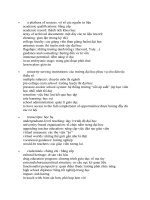Writing task 2 8.5+ 8999 organised tours (1)
Bạn đang xem bản rút gọn của tài liệu. Xem và tải ngay bản đầy đủ của tài liệu tại đây (200.35 KB, 8 trang )
Overall band score
8.5
8+9+9+9
See below C&C LR GRA
Model answer
WRITING TASK 2
You should spend about 40 minutes on this task.
Write about the following topic:
Organized tour to remote areas and community is increasingly popular.
Is it a positive or negative development for the local people and the
environment?
Give reasons for your answer and include any relevant examples from your own
knowledge or experience.
Write at least 250 words.
Original answer It is widely recognized that visiting areas and communities off the beaten track is
gaining more popularity, with many travel agencies offering organized tours for
those interested. Despite some legitimate concerns, I believe this
commercialization is a welcome development overall.
Granted, opponents might argue the influx of visitors to remote areas can take a
toll on the local environment. Tourists, they say, may damage natural habitats
through activities such as trampling vegetation or throwing garbage all over the
place. These problems, however, are far from insolvable, with the local
authorities ramping up their efforts to protect the environment. This has proven
successful in the Galapagos Islands, a popular ecotourism destination in Ecuador.
The local government here has strictly limited the number of visitors to sensitive
areas, as well as imposing hefty fines for those who violate their environmental
regulations. Thanks to this, even in the face of increasing tourism, the natural
beauty of the islands still remains largely intact.The argument in favor of the
commercialization of remote locations and communities is further fortified by the
numerous benefits it can confer upon the locals. First, the development of
tourism can create employment opportunities for indigenous people in such areas
as food and beverage, accommodation, and transportation. Also, organized tours
can help promote local businesses and products like crafts and souvenirs,
providing a market for local producers. These opportunities can provide higher
incomes for families and improve their standard of living as a result. This effect
can be seen in the Galapagos Islands, where the average residents are now
reported to enjoy a much higher living standard with access to a wide range of
facilities and services, something that had been non-existent before tourism took
place and the traditional livelihoods were limited.
In conclusion, although there are some concerns about the environmental
implications of increasing tourism in far-flung areas and communities, I would
contend that these problems can be countered with government intervention. In
addition, this trend is generally a positive, considering the improvements it can
make to the locals’ lives.
Overall band score
8.5
8+9+9+9
TR – Task Response nb – GRA and LR errors have not been corrected
Band score 8
You have a clear position throughout and all parts of the question are addressed.
Your position is coherent and well-argued.
The ideas are relevant, extended and there are no contradictions.
The example of the Galapagos is good, but I wouldn’t assume all remote areas are
equally well protected.
Other ideas/suggestions
You could introduce a proviso – provided that tourists understand
and respect […]
The construction of infrastructure damages the environment,
however “sustainable” they claim it to be
Thanks for not mentioning CO2
Negative effects of tourism —
The lives of local people are changed – it may be great that
they can make some money, but their traditional lives may be
lost. People working with tourists can end up making more
money than people living traditional lifestyles, which may
mean the traditions are lost or die out
Advice On Brainstorming For Task 2
As you’re planning and writing your answer, remember to constantly
ask yourself if you’re answering the question. Check back to the
question a few times as you think of ideas to make sure they're
directly relevant.
Make sure your introduction directly addresses the
question.
Make sure your ideas address all parts of the question. If
the question asks for solutions, in the plural, you must
suggest at least 2.
Make sure your main ideas, as stated in the first sentence
of the main body paragraphs, are directly relevant to the
question.
Make sure your supporting ideas, which follow the main
ideas in the main body paragraphs, directly support the
main idea.
Be especially careful if you’ve answered similar question
before, as there will always be important differences.
Make sure your conclusion directly answers the question,
that it is consistent with the ideas in the main bodies, and
that it does not contradict the introduction.
It is widely recognized that visiting areas and communities off the beaten track is
gaining more popularity, with many travel agencies offering organized tours for
those interested. Despite some legitimate concerns, I believe this
commercialization is a welcome development overall.[a]
Granted, opponents might argue the influx of visitors to remote areas can take a
toll on the local environment[b]. Tourists, they say, may damage natural habitats
through activities such as trampling vegetation or throwing garbage all over the
place. These problems, however, are far from insolvable, with the local
authorities ramping up their efforts to protect the environment. This has proven
successful in the Galapagos Islands, a popular ecotourism destination in Ecuador.
The local government here has strictly limited the number of visitors to sensitive
areas, as well as imposing hefty fines for those who violate their environmental
regulations. Thanks to this, even in the face of increasing tourism, the
natural beauty [c]of the islands still remains largely intact.
The argument in favor of the commercialization of remote locations and
communities is further fortified by the numerous benefits it can confer upon the
locals. First, the development of tourism can create employment opportunities
for indigenous people in such areas as food and beverage, accommodation, and
transportation. Also, organized tours can help promote local businesses and
products like crafts and souvenirs, providing a market for local producers. These
opportunities can provide higher incomes for families and improve their standard
of living as a result. This effect can be seen in the Galapagos Islands, where the
average residents are now reported to enjoy a much higher living standard with
access to a wide range of facilities and services, something that had been nonexistent before tourism took place and the traditional livelihoods were limited. [d]
In conclusion, although there are some concerns about the environmental
implications of increasing tourism in far-flung areas and communities, I would
contend that these problems can be countered with government intervention. In
addition, this trend is generally a positive, considering the improvements it can
make to the locals’ lives.[e]
C&C - Cohesion and Coherence nb GRA and LR errors have not been corrected
Band score 9
Excellent cohesion and coherence throughout, with no errors.
The sentences have a natural flow characteristic of high band score answers.
Paragraphing for Task 2
I recommend you write 4 paragraphs as follows:
Write an introduction, that explains what the question is.
After reading the introduction, the reader should have a
good idea what the essay is about, and what your position
(opinion) is. It should be possible to write an introduction in
under 50 words. It is not necessary to write a long
background statement.
Write 2 main body paragraphs. This should allow you to
expand on the ideas sufficiently to persuade the examiner
that you’ve fully supported the main ideas. If you write 3
main bodies, it is more difficult to expand and support them
sufficiently to get a high score.
If it’s a two-part question, answer the questions in the order
they’re given and write one paragraph per question.
The main body paragraphs should be 100-120 words, and
each paragraph should have a clear topic sentence and 2 or
more supporting ideas which support the topic sentence with
reasons, evidence, and examples. Do not waste time with
lots of background information.
The topic sentences should directly address the question.
The conclusion should be consistent with the introduction
and the main ideas, and it should not introduce new ideas. It
should directly answer the question. Do not leave the
examiner in any doubt about whether you’ve answered the
question.
If you write a third paragraph in a discuss both sides question
to clarify your position, make sure that give a good reason to
reject one of the sides. If you just restated the original ideas
about one side, the examiner may decide you have covered
one side more than the other.
It is also ok to write a third body paragraph in a to what
extent question if you have main ideas which both agree and
disagree with the proposition. Avoid short paragraphs, with
under 70 words, as it may be difficult to show a clear central
topic in a short paragraph.
It is widely recognized that visiting areas and communities off the beaten track is
gaining more popularity, with many travel agencies offering organized tours for
those interested[f]. Despite some legitimate concerns[g], I believe this
commercialization is a welcome development overall.[h]
Granted, opponents might argue the influx of visitors to remote areas can take a
toll on the local environment[i]. Tourists, they say, may damage natural habitats
through activities such as trampling vegetation or throwing garbage all over the
place. These problems, however, are far from insolvable[j], with the local
authorities ramping up their efforts to protect the environment. This has proven
successful in [k]the Galapagos Islands, a popular ecotourism destination in Ecuador.
The local government here has strictly limited the number of visitors to sensitive
areas, as well as imposing hefty fines for those who [l]violate their environmental
regulations. Thanks to this[m], even in the face of [n]increasing tourism, the natural
beauty of the islands still remains largely intact.
The argument in favor of the commercialization of remote locations and
communities is further fortified by the numerous benefits it can confer upon the
locals[o]. First[p], the development of tourism can create employment opportunities
for indigenous people in such areas as [q]food and beverage, accommodation, and
transportation. Also, organized tours can help promote local businesses and
products like crafts and souvenirs, providing a market [r]for local producers. These
opportunities [s]can provide higher incomes for families and improve their
standard of living as a result. This effect can be seen in [t]the Galapagos
Islands, where the average residents are now [u][v]reported to enjoy a much higher
living standard with access to a wide range of facilities and services, something
that had been non-existent [w]before tourism took place and the traditional
livelihoods were limited.
In conclusion, although [x]there are some concerns about the environmental
implications of increasing tourism in far-flung areas and communities, I would
contend that these problems can be countered with government intervention. In
addition[y], this trend is generally a positive, considering the improvements it can
make to the locals’ lives.
LR- - Lexical resource nb Some GRA errors have not been corrected
Band score 9
Vocabulary is used accurately with sufficient flexibility to show precise meaning,
with a wide variety of vocabulary, used accurately and with a high level of control.
Minor inaccuracies as seen in my suggestions are not sufficient to affect your
score.
It is widely recognized that visiting areas and communities off the beaten track is
gaining more popularity, with many travel agencies offering organized tours for
those interested. Despite some legitimate concerns, I believe this
commercialization is a welcome development overall.
Granted, opponents might argue the influx of visitors to remote areas can take a
toll on the local environment. Tourists, they say, may damage natural habitats
through activities such as trampling vegetation or throwing garbage all over the
place[z]. These problems, however, are far from insolvable[aa], with the local
authorities ramping up their efforts to protect the environment. This has proven
successful in the Galapagos Islands, a popular ecotourism
destination in [ab]Ecuador. The local government here has strictly limited the
number of visitors to sensitive areas, as well as imposing hefty fines for [ac]those
who violate their environmental regulations. Thanks to this, even in the face of
increasing tourism, the natural beauty of the islands still remains largely intact.
The argument in favor of the commercialization of remote locations and
communities is further fortified by the numerous benefits it can confer upon the
locals. First, the development of tourism can create employment opportunities
for indigenous people in such areas as food and beverage, accommodation, and
transportation. Also, organized tours can help promote local businesses and
products like crafts and souvenirs, providing a market for local producers. These
opportunities can provide higher incomes for families and improve their standard
of living as a result. This effect can be seen in the Galapagos Islands, where the
average residents are now reported to enjoy a much higher living standard with
access to a wide range of facilities and services, something that had been nonexistent before tourism took place [ad]and the traditional livelihoods were
limited[ae].
In conclusion, although there are some concerns about the environmental
implications of increasing tourism in far-flung areas and communities, I would
contend that these problems can be countered with government intervention[af].
In addition, this trend is generally a positive, considering the improvements it can
make to the locals’ lives.
GRA – Grammatical range and accuracy nb Some LR errors have
not been corrected
Band score 9
Grammar is used accurately a wide variety of structures, which should be good for
a band score 9.
Punctuation is use correctly throughout.
Appropriate structures are used throughout.
It is widely recognized that visiting areas and communities off the beaten track is
gaining more popularity, with many travel agencies offering organized tours for
those interested. Despite some legitimate concerns, I believe this
commercialization is a welcome development overall.
Granted, opponents might argue the influx of visitors to remote areas can take a
toll on the local environment. Tourists, they say, may damage natural habitats
through activities such as trampling vegetation or throwing garbage all over the
place. These problems, however, are far from insolvable, with the local
authorities ramping up their efforts to protect the environment. This has proven
successful in the Galapagos Islands, a popular ecotourism destination in Ecuador.
The local government here has strictly limited the number of visitors to sensitive
areas, as well as imposing hefty fines for those who violate their environmental
regulations. Thanks to this, even in the face of increasing tourism, the natural
beauty of the islands still remains largely intact.
The argument in favor of the commercialization of remote locations and
communities is further fortified by the numerous benefits it can confer upon the
locals. First, the development of tourism can create employment opportunities
for indigenous people in such areas as food and beverage[ag], accommodation, and
transportation. Also, organized tours can help promote local businesses and
products like crafts and souvenirs, providing a market for local producers. These
opportunities can provide higher incomes for families and improve their standard
of living as a result. This effect can be seen in the Galapagos Islands, where the
average residents are now reported to enjoy a much higher living standard with
access to a wide[ah] range of facilities and services, something that had been nonexistent before tourism took place and the traditional livelihoods were limited.
In conclusion, although there are some concerns about the environmental
implications of increasing tourism in far-flung areas and communities, I would
contend that these problems can be countered with government intervention. In
addition, this trend is generally a positive, considering the improvements it can
make to the locals’ lives.









